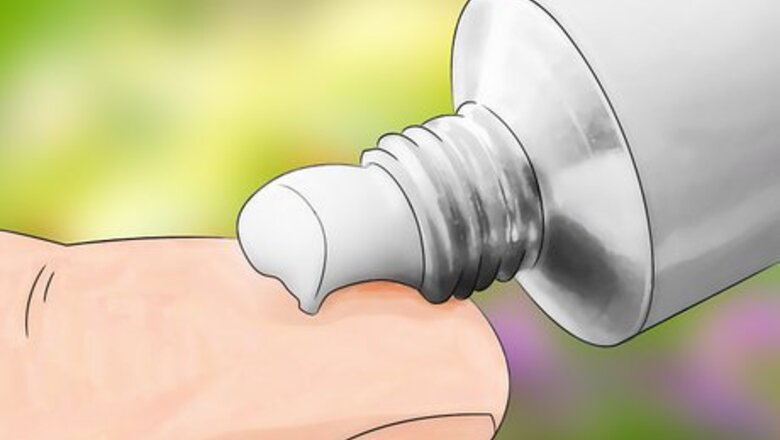
views
Applying Medications
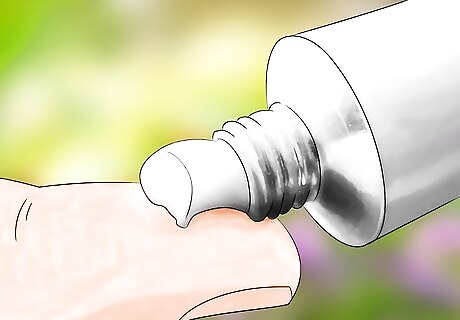
Use an antihistamine to combat the allergic response. Insect bites itch because of the body's autoimmune reaction against the anticoagulants in the insect's saliva. This prevents your blood from clotting as the insect drinks. After the insect is gone, a small amount of the saliva remains in your skin. Use a pea-sized amount of an antihistamine cream and smear it into the bite until it is fully absorbed. Take a non-sedating oral antihistamine such as 10 mg cetirizine once daily to help with symptoms. Use of both oral and topical antihistamines at the same time is not recommended.
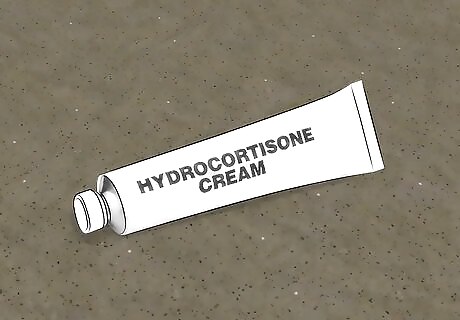
Apply a hydrocortisone cream to the bite to soothe the itchy, red, puffy skin around the bite. Hydrocortisone takes longer to start working, but once it does, the relief will last longer. 1% hydrocortisone creams can be purchased over the counter and will reduce the inflammation. Put a pea-sized amount on your finger and rub it into the bite until it soaks in completely.
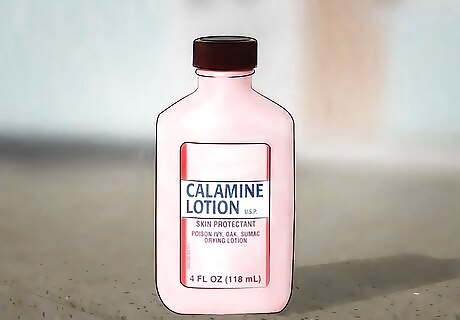
Dab calamine lotion on the bite. This will help draw out the fluids that have gathered under the skin making the bite puffy. Lotions that pramoxine will also help. Reapply the lotion according to the manufacturer's instructions. The lotion will dry out the bite and remove any chemicals from the bug's saliva that are irritating your skin.
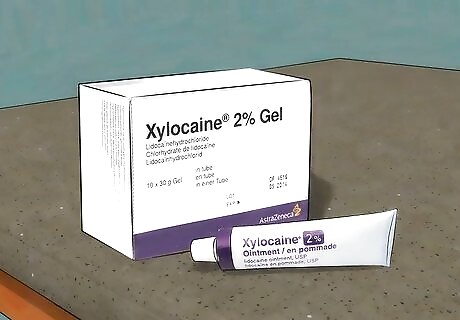
Use pain relieving medications as necessary. If the bite is painful and swollen, pain medications should help. Put a topical anesthetic on the bite to get immediate relief from the discomfort. A 2% Xylocaine Gel works well. If a topical pain reliever does not help, try an over the counter oral painkiller such as paracetamol (not available in the United States) or ibuprofen.
Preventing Infection and Seeking Medical Care
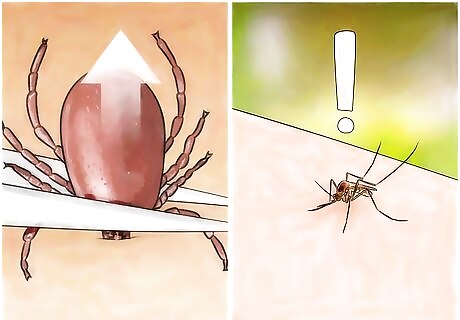
Remove the insect if it is still biting you. If you were bitten by a mosquito, chances are you noticed immediately when it bit you, and squashed it then. However, some insects like ticks, secrete an anesthetic in their saliva so the animal or person they bite won't feel it, enabling them to feed longer. It is very important to remove ticks as soon as possible, because this reduces the chances of getting a tick borne disease. Use a tweezers to grip the tick as close as possible to your skin. Pull perpendicular to your skin with a steadily increasing pressure until the tick comes out. Don't twist or jerk the tick because this can cause the tick's body to break off from the head/mouth parts and leave them in your skin. You want to remove the whole tick. If the head or mouth parts do remain in your skin, disinfect the tweezers with rubbing alcohol and remove them. If you cannot remove them yourself, have a doctor do it. Do not apply nail polish, petroleum jelly, or a smouldering match to the tick and then wait for it to detach on its own. To minimize the risks of tick borne diseases, you should remove it yourself as soon as possible.
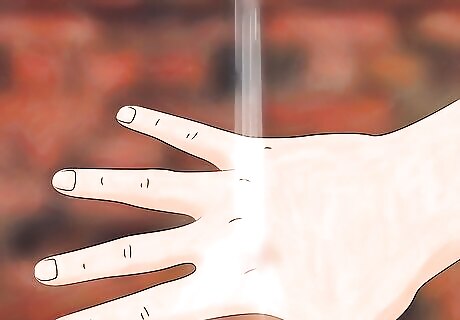
Wash the bite. This will clean the area, promote quick healing, and reduce the likelihood of it becoming infected. Apply clean water and scrub the bite gently with a mild soap. This will prevent dirt and bacteria from getting into the wound and causing an infection.
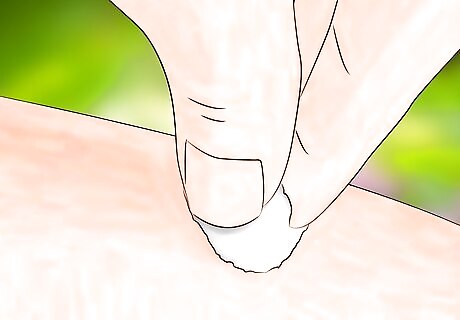
Use disinfectant to kill any bacteria or other pathogens. Put the disinfectant on a sterile cotton ball and then gently swab the bite. It may sting a little.The following chemicals have excellent germicidal properties and will work well. Rubbing alcohol Iodine scrub Hydrogen peroxide
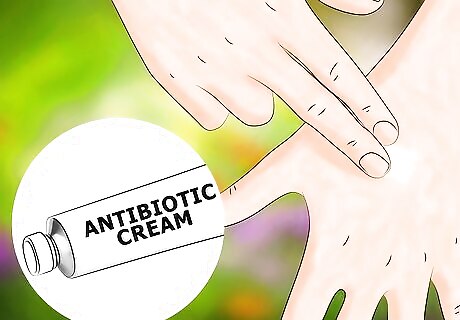
Apply a topical antibiotic to the bite to prevent the growth of bacteria. Triple antibiotic creams are available over the counter and are very effective. Always read and follow the instructions on the package. Consult a doctor before using these medications on infants or if you are pregnant.
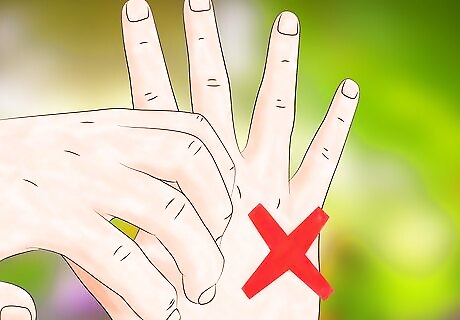
Don't scratch the bite. When you scratch you are irritating it and introducing bacteria into the bite with your fingers and fingernails. And, even worse, if you scratch it open, it will take longer to heal and is more likely to become infected. If you have difficulty not scratching, try putting a band aid on it to cover it. This will remind you not to scratch and it will also prevent you from scratching in your sleep.
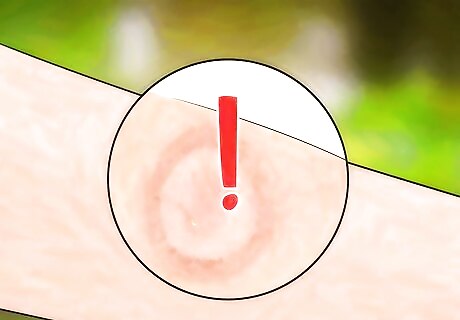
Get medical help immediately if you develop a strange rash. Some insects carry serious diseases which have characteristic rashes. A red donut or bull's eye around a tick bite is a symptom of Lyme Disease and must be treated as soon as possible with antibiotics. If you develop a fever with a red or black spotty rash, see a doctor to be screened for Rocky Mountain Spotted Fever.
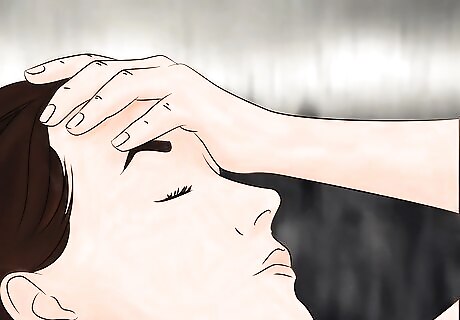
Seek medical attention if you become sick after being bitten while traveling. Some insects carry diseases which do not produce rashes, but often come with flu-like symptoms. Insects carry different diseases in different parts of the world. So if you become sick after traveling and being bitten by insects, be sure to tell your doctor where you were traveling, that you were bitten, and what you symptoms are. See a doctor if you develop any of the following symptoms: Fever Headache Dizziness Joint and muscle aches Vomiting
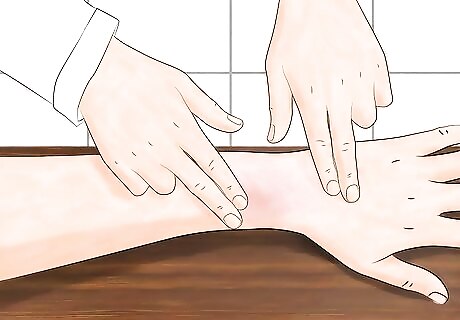
See a doctor immediately if you think you are having a systemic allergic reaction. An epinephrine injection will be administered immediately. Symptoms include: Hives or rashes spreading beyond the site of the bite Itching or swelling in other parts of your body besides where you were bitten Difficulty breathing or wheezing Difficulty swallowing Dizziness Vomiting Racing heart
Using Home Remedies
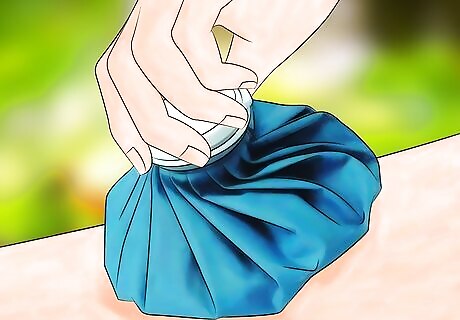
Cool the bite with a cold compress. The cold will reduce the swelling and numb the area a little bit. If you don't have an ice pack ready and waiting for use in the freezer, you can quickly make one by wrapping ice cubes or a package of frozen peas in a towel. Be careful not to hold the ice on your skin for too long. Limit it to 15 to 20 minutes at a time.
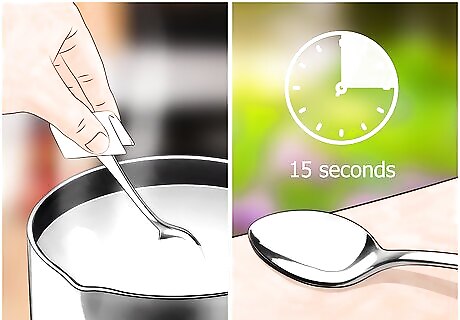
Apply heat to the bite. If cold does not work to reduce the itching, try using heat. Heat can break down some of the chemicals in the bite that cause the itch, giving you relief. Heat a spoon in boiling water. Hold it with a potholder so that you don't burn your hand. Gently press the back of the spoon onto the bite. Hold it there for 15 seconds and then remove it. Use a blow dryer to heat the bite and the area around the bite.
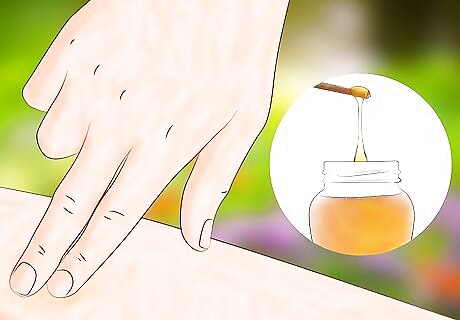
Try raw honey. Honey will help reduce inflammation and the stickiness will make it less rewarding to scratch. Clean the bite thoroughly with soap and water. Smear a quarter teaspoon of honey onto the bite and then let it sit. The honey will be sticky, so be sure to keep the area clean so that dirt doesn't get stuck in the honey and transferred to the bite.
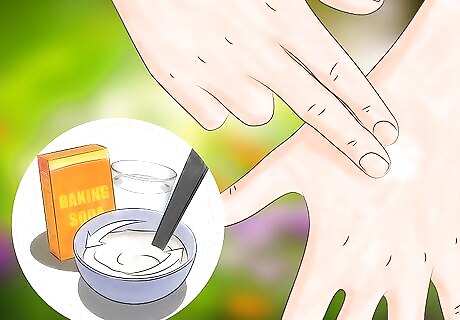
Dry out the bite with a baking soda paste or toothpaste. This will draw out fluids and toxins, helping it to heal faster. Make a baking soda paste by mixing baking soda and water in a 2:1 ratio, then dab the mixture onto and around the bite. Let it dry completely before wiping it off. This will help dry out the bite and remove toxins. Dab a pea-sized drop of toothpaste onto the bite and let it dry on the bite. Toothpaste is an astringent and it will help draw out the fluids under your skin.
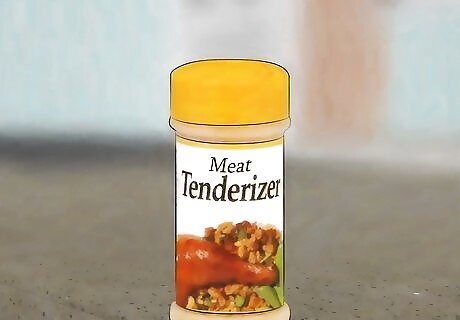
Apply meat tenderizer to the bite. Meat tenderizer contains enzymes that break down proteins. This will help reduce the itching by breaking down chemicals in the bug's saliva which are in your skin. Dissolve the meat tenderizer in a small amount of water. Dab the mixture directly onto the point where the bite occurred. You should get relief right away. Let it dry and then wash the meat tenderizer off with water.
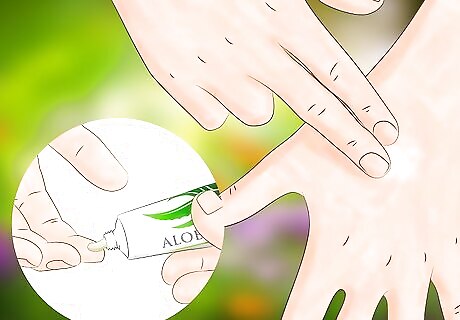
Rub aloe vera on the affected area. The aloe will have a cooling, soothing effect and is excellent for helping your skin heal. If you have a commercially manufactured aloe vera gel, apply that generously over the bite and surrounding area. If you have an aloe plant in your house, break off a leaf and split it open. Apply the gooey gel directly onto the bite.
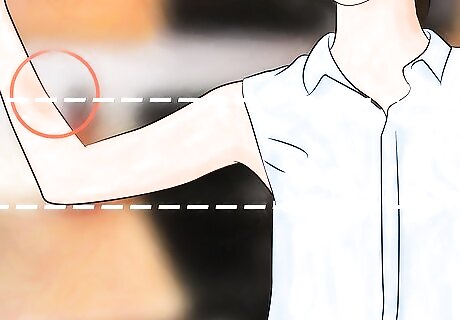
Raise the bitten area above your heart if possible. If the bite occurred on your arm or leg, raise the limb above your heart. To be comfortable, try lying in bed and propping your arm or leg up on a pile of pillows. Stay in this position for at least 30 minutes to give the swelling time to go down.
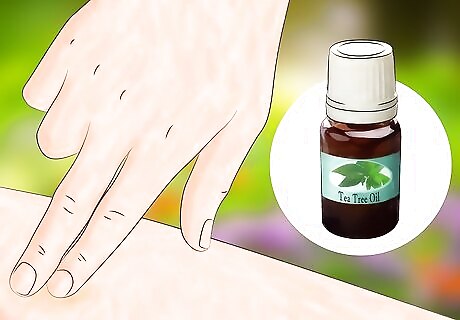
Put essential oils on the bite. These methods have not been scientifically tested, but people have found them to be useful. Any time you apply essential oils to your skin use caution, essential oils can cause irritation or allergic reactions in some people. Tea tree oil has antibacterial properties and may help prevent infection, as well as relieve itching, swelling and pain. Put a small drop on your finger or a clean cotton ball and then rub it directly onto the bite. Try other essential oils like lavender or coconut to reduce the itching and swelling. These also have the benefit that they will smell good.
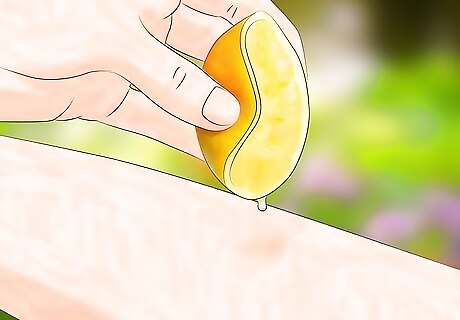
Use citrus juice or vinegar to stop the itching. The acid will help kill bacteria, prevent infection, promote healing and reduce the itching. Lemon juice, lime juice and apple cider vinegar are common cooking ingredients that have high acidity. Soak the edge of a kitchen towel or napkin in the juice/vinegar and then dab it onto the bite until it is thoroughly coated. Let the juice/vinegar dry and reapply it whenever the itching starts again.
Avoiding Being Bitten Again
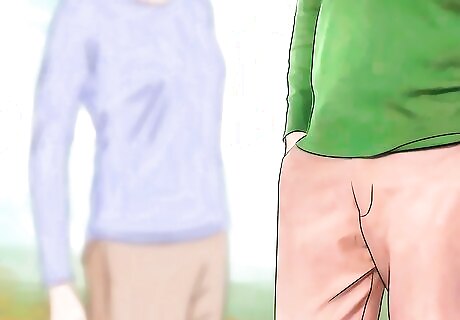
Reduce the amount of skin you have exposed. By wearing long pants and long sleeves, you will reduce the amount of skin available to bite. While some insects like mosquitos can still bite through clothing, the number of bites you get will be reduced.
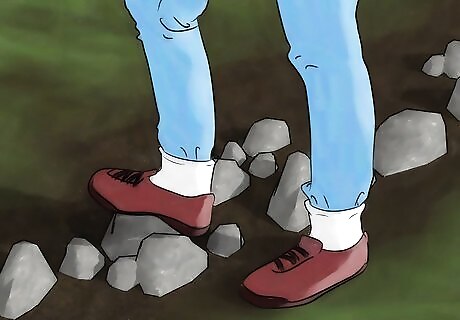
Tuck your pants into your socks while hiking. This will protect you from ticks. After hiking, thoroughly check your entire body for ticks and promptly remove any you find.
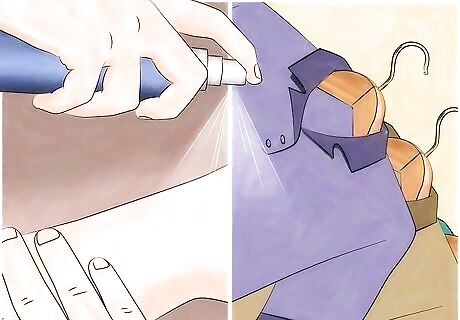
Spray bug repellents on your skin and clothing. The most effective sprays contain DEET (N, N-diethylmeta-toluamide) or picaridin and are widely available. They will reduce mosquito, tick, and chigger bites. Avoid getting the spray in your eyes and do not inhale it. Do not spray it into open wounds. Consult with a doctor before using bug repellents if you are pregnant. Consult with a doctor before using sprays on infants. Shower to wash the spray off your skin when you no longer need it.
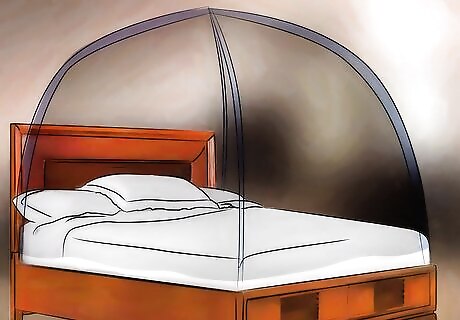
Sleep under a bug net if you are traveling and staying at a hotel where there are no screens on the windows. This will prevent you from getting bitten while you sleep. Be sure to check the net for holes.
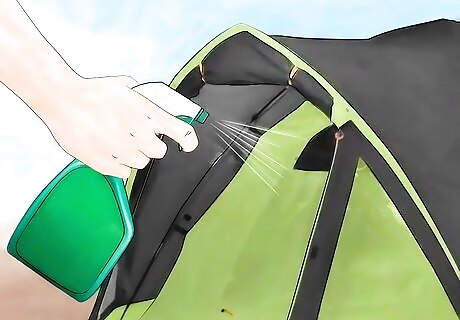
Use Permethrin on clothing, bed nets, and camping gear. The protection should last through multiple washings.
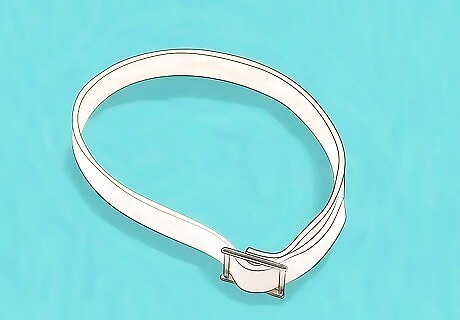
Put flea and tick collars on pets. Be sure to check the collars regularly to prevent them from bringing fleas and ticks into the house. This can help keep pests out of your home.
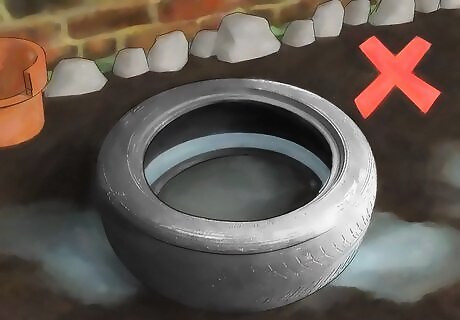
Don't leave pools of standing water near your house. Mosquitos breed in standing water, so emptying them will reduce the mosquito population.




















Comments
0 comment